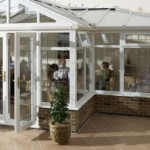What to Ask When Buying a Conservatory
A conservatory is a popular choice for homeowners looking to increase their living space. They offer an easy way to extend living space into the outdoors without making any major alterations to the structure of the house. Better yet, they’re really versatile. A conservatory can be used as a living room, dining room, playroom, an office – and much more.
But clearly not all conservatories are created equally, so it’s worth considering the differences you might encounter, and how they might be successfully navigated. When you’re discussing a potential purchase, you can save yourself a great deal of hassle in the long-term by asking the right questions.
How much will my conservatory cost?
This question might seem the most obvious one – how much is the supplier going to charge you to build this conservatory? But you don’t just want a ballpark figure - you’ll want to ask for a detailed breakdown of what your money is going to buy, right from the start – that way you’ll be able to stay within your budget, and avoid hidden surprises.
Before you can do this however, you’ll need to agree on your conservatory’s design. Take time in initial meetings with the company to make your expectations clear and develop a design that you are happy with. The company will then be able to provide you with a comprehensive price in order to ensure that you get the conservatory your heart is set on.
Can you offer design and regulatory planning advice?
Beyond the work of actually building the conservatory, some companies will offer detailed planning and design advice that can help reduce the overall cost of your project (in terms of time, energy and money) whilst also ensuring the conservatory that you have designed and built is the one from your dreams. A company capable of developing your design ideas and also ensuring planning applications and building regulations are tackled as and when needed are more likely to be able to fully manage the whole project. Be sure, therefore, to ask whether the company can offer such advice as you will be glad you did once the project is underway.
How long will the build take?
Exactly how long a conservatory will take to complete depends upon the specs of each project, however on average it should take around 2 months from commencement to completion. Bear in mind that adverse weather conditions have the potential to delay things.
What experience do you have?
Naturally, if you’re going to allow a company to enter and extensively modify your home, you’ll want to ensure that you’re getting a quality service and conservatory to match One way to do this is to ask how long the company has been trading. This isn’t to say that newer firms are inherently inferior – just that inferior companies don’t tend to last much longer than a few years before their reputation drags them down.
What accreditations do you have?
Another way to establish the competence of the installer is through their accreditations. These are awarded by specialist independent bodies, and help quality installers to prove that they know what they’re doing. Be sure to investigate the accreditations you’re presented with; reputable organisations include the GGF and TrustMark.
Do you have a showroom?
This isn’t a question that should make or break your decision, but a showroom is a positive sign – it generally means the company is well established and won’t be going anywhere anytime soon. It’s also a chance for you to look at the products, see the styles and finishes on offer, and assess the quality of their work.
What material will you use to build my conservatory?
Conservatories can be built from a variety of different materials – wood, UPVC and aluminium. A high-quality firm will be able to talk you through the available options, and discuss the advantages and disadvantages of each; that way you’ll be sure your choice reflects what’s right for your home.
As a general rule, aluminium and wooden conservatories will cost more than UPVC, although the size and specifications of the conservatory are significant determiners of price, too.
Do you offer aftercare service?
Another way to be sure that your conservatory is going to be installed competently is the amount of aftercare that’s on offer. This is so for two reasons. Firstly, if a company is able to offer aftercare, you’ll be able to rest easy knowing that any issues that do develop will be dealt with relatively swiftly as part of your guarantee. Secondly, you’ll know the company is fairly confident that significant issues are unlikely to develop. If a company doesn’t offer aftercare, consider it a big red flag.
Do you offer an insurance-backed guarantee?
By the same token, it’s important to secure an insurance-backed guarantee when you’re shopping for your conservatory. This will uphold your guarantee in the unlikely event that the company ceases trading before your conservatory’s completed.
What about building regulations and planning permissions?
Generally speaking, conservatories are exempt from planning permission and building regulation requirements. There are, however, some exceptions – your conservatory will need to be separated from the house by ‘external quality’ doors, for example. A good provider will be able to take care of all of this for you, ensuring that you’re steered around any legal problems before they occur.
How energy efficient is the conservatory?
When we’re considering the cost of a conservatory, we shouldn’t just think about things like materials and labour. A conservatory, being made of glass, has the potential to introduce heat inefficiency into your home – if it’s installed incorrectly or built using dated processes and materials.
On the other hand a conservatory that’s been installed correctly and made from the latest components can in fact reduce heat loss; particularly if it is placed over an old set of inefficient doors. It can also act as a heat sink and radiate heat generated by the sun’s warmth back into the property via the building fabric.
The biggest determiner of this will be the sort of glazing being used.
Double-glazing is the standard in most modern conservatories, as it offers far better heat-retention than single-glazing. A layer of inert gas, like argon, is sandwiched between two parallel sheets of glass. This, when combined with a quality frame, coated glass, and a warm edge spacer bar, dramatically slows the flow of heat from one side of the window to the other.
The effectiveness of double glazing is typically measured by its ‘U’ and ‘G’ value.
The U value measures the ease with which heat passes from the inside of the property to the outside. G Value measures solar gain- the transfer of heat from the outside to the inside, and also light transmittance, which measures the amount of light passing through the unit.
This means that an A+ rated window system (the best you can get) will allow for the correct levels of heat to leave the property and solar gain entering, in order to maintain a comfortable atmosphere.
Lower U values are better than high values, while the very best windows will have U values lower than 1. It’s worth noting that the minimum requirement, by law, for replacement windows is an overall window ‘U’ value of 1.6 or lower. This equates to an energy rating of ‘C’.
If, however, you want to be able to use your conservatory year round (and why wouldn’t you?) it’s critical that units which far exceed the minimum legal requirements are used.
What are your online reviews like?
Last but not least, don’t forget to check out whether the company has any online reviews (and what they say!). Naturally, this isn’t a question you should directly ask to the provider themselves – but if you find that any specific criticisms are recurring in online reviews, you might want to give the firm an opportunity to explain and defend themselves.



















Be the first to comment.